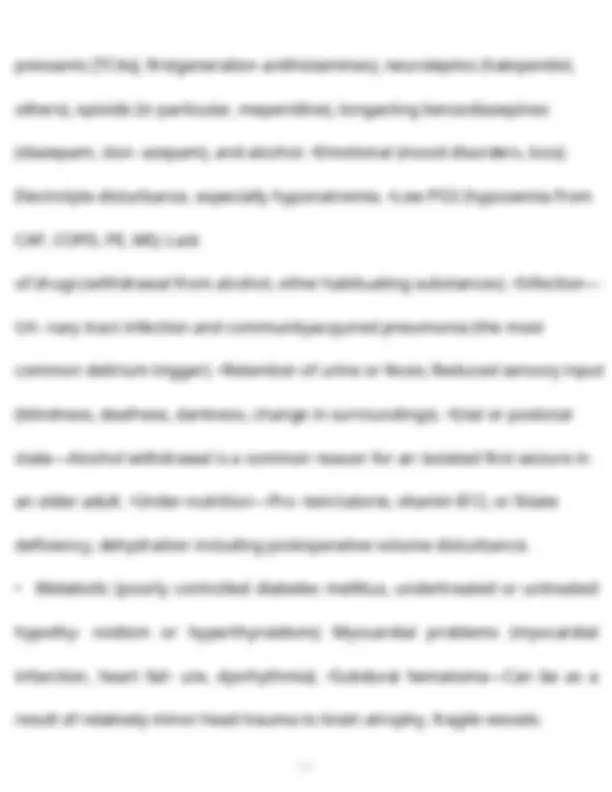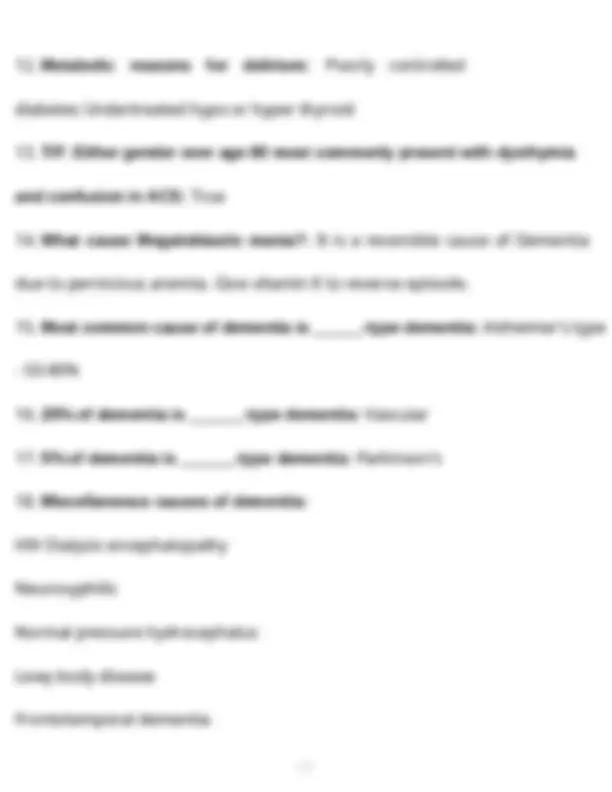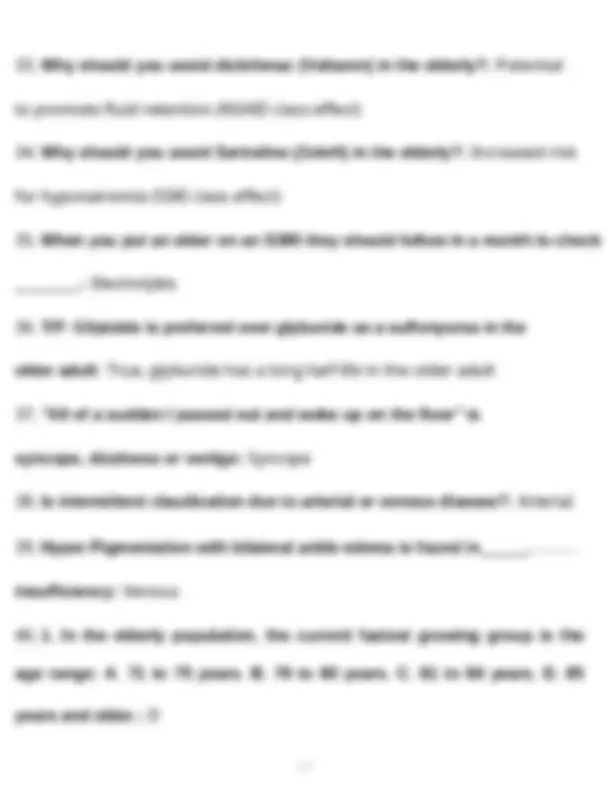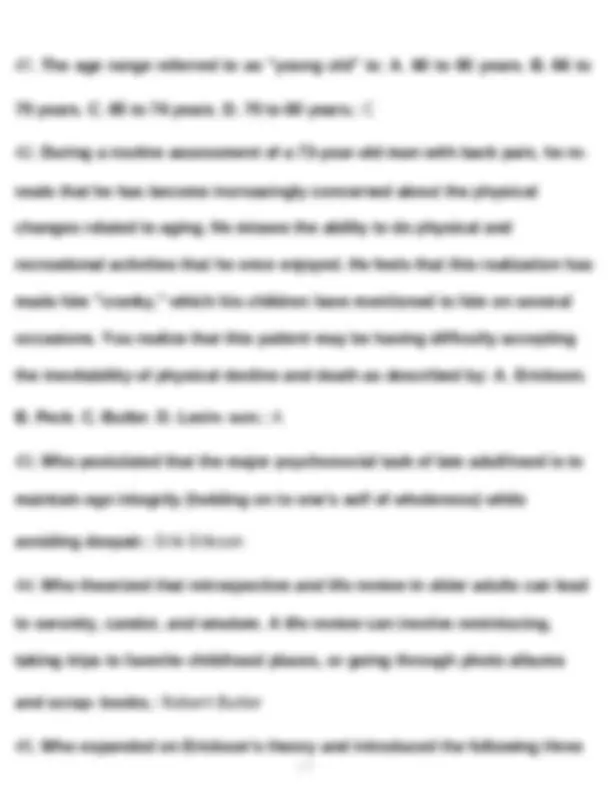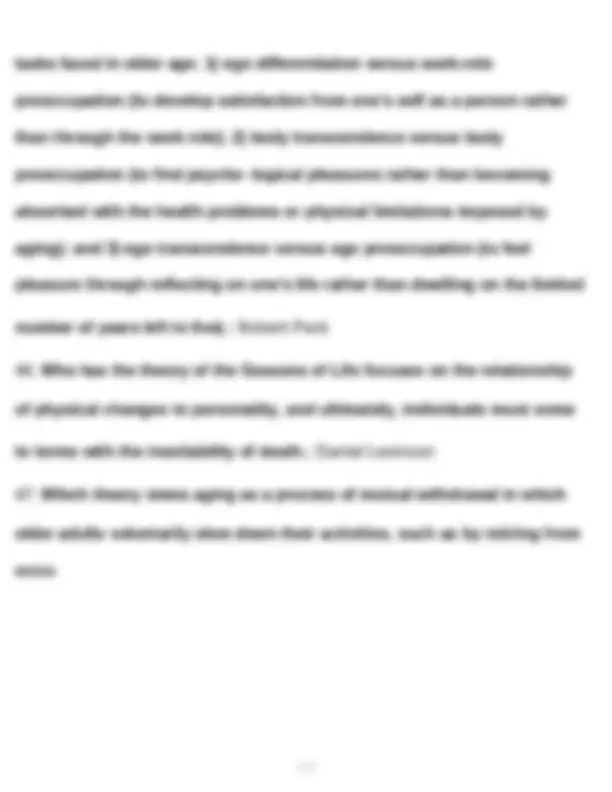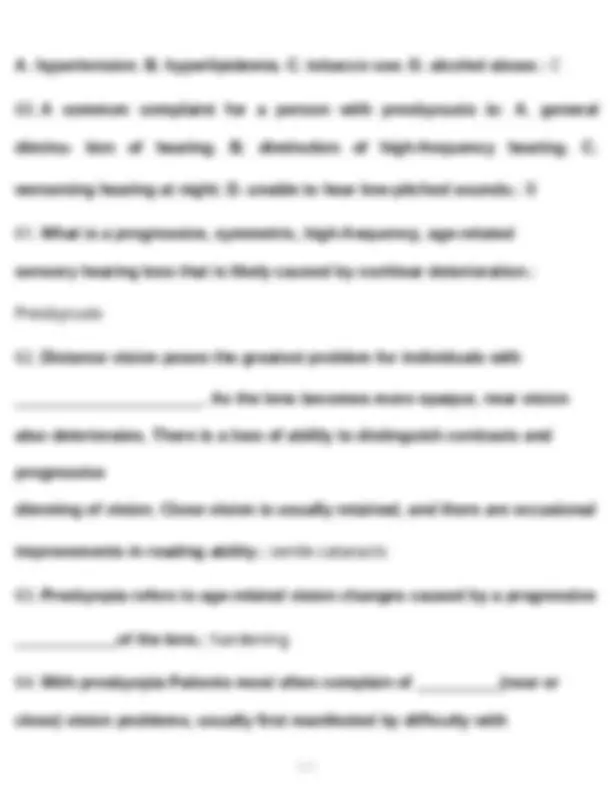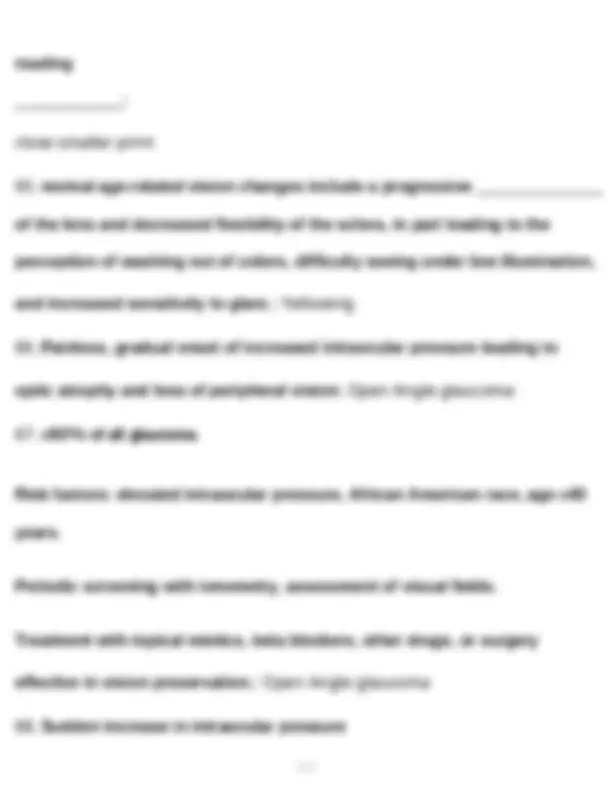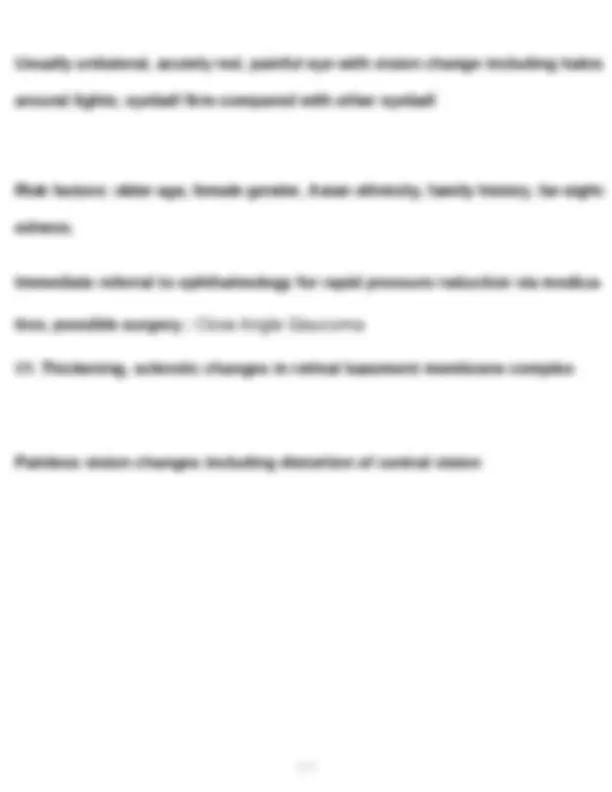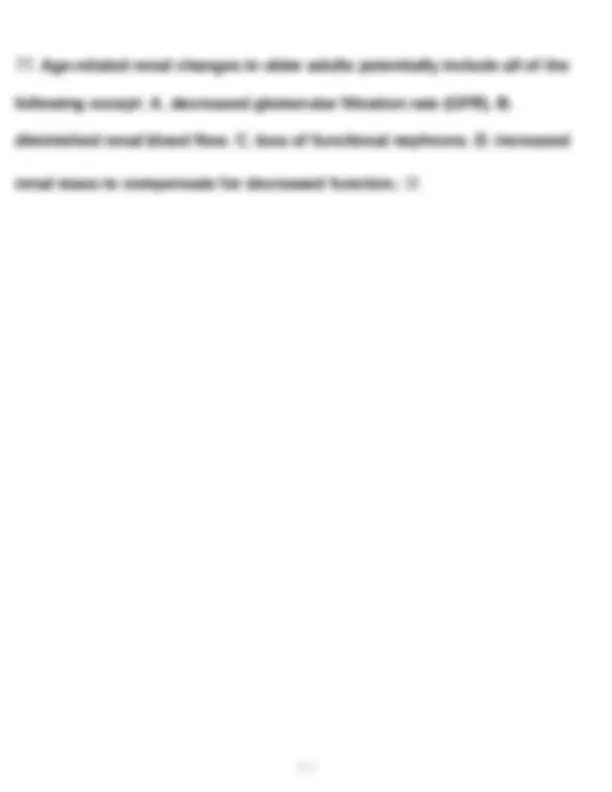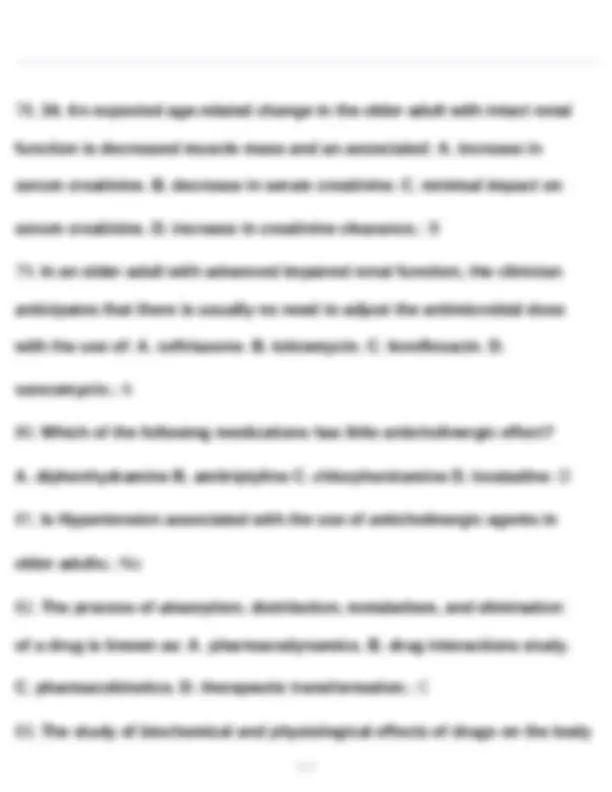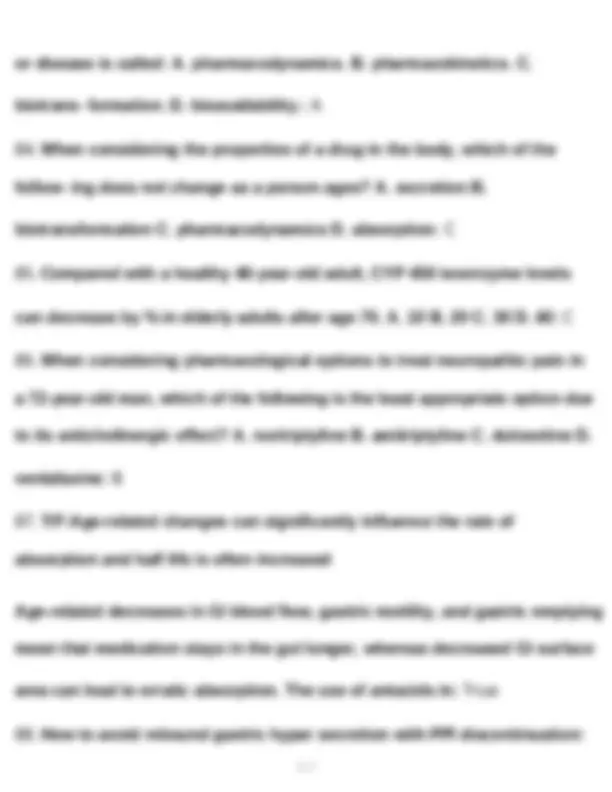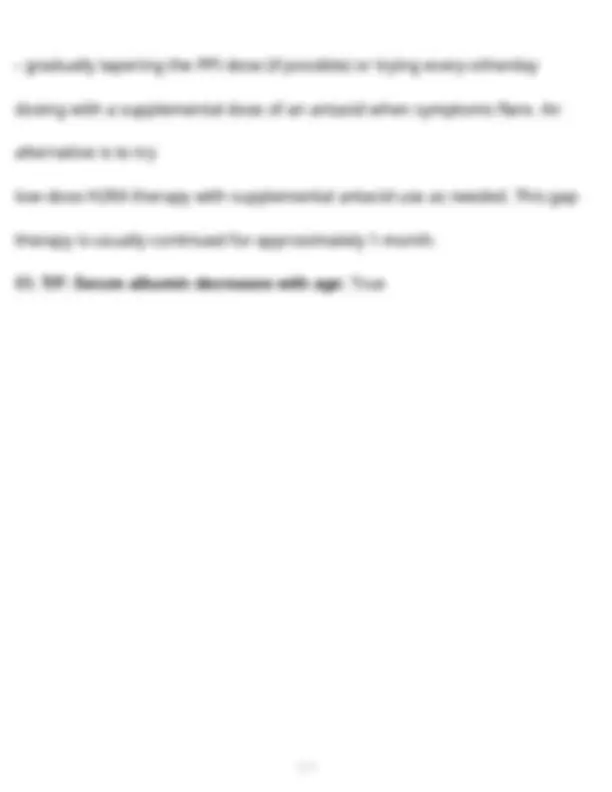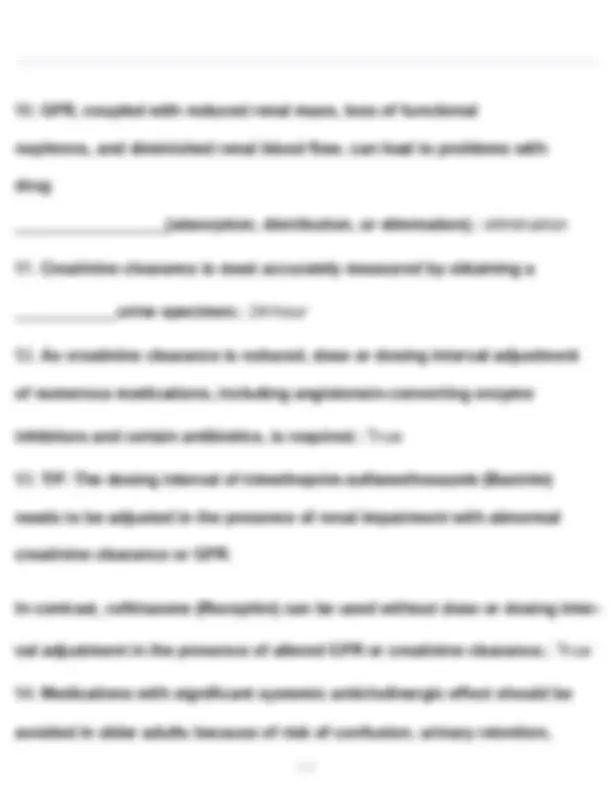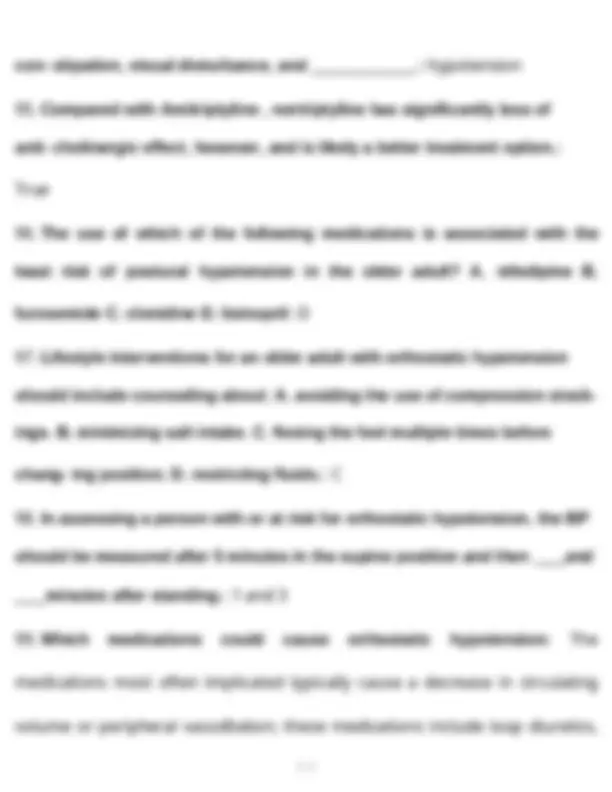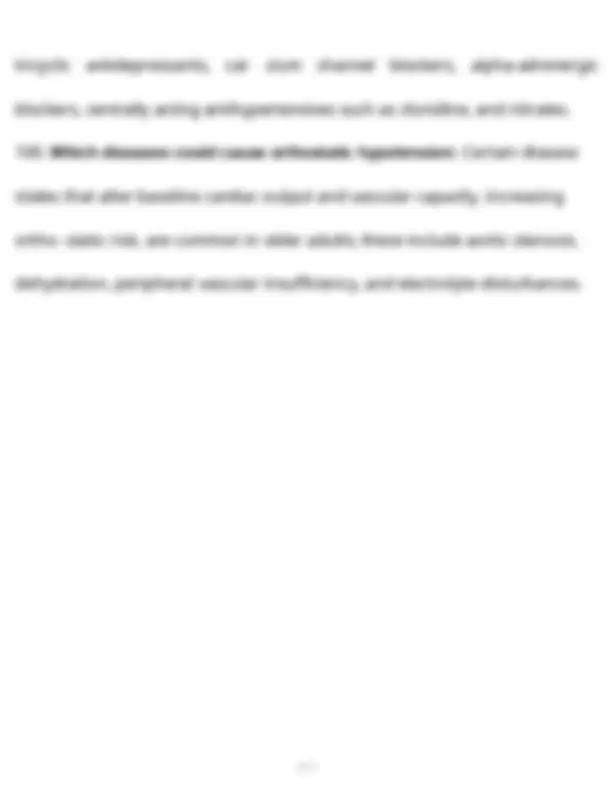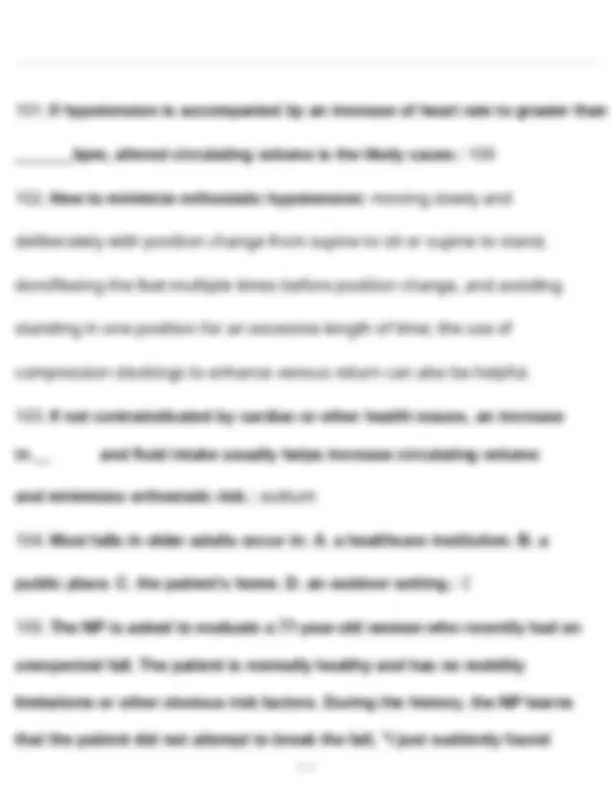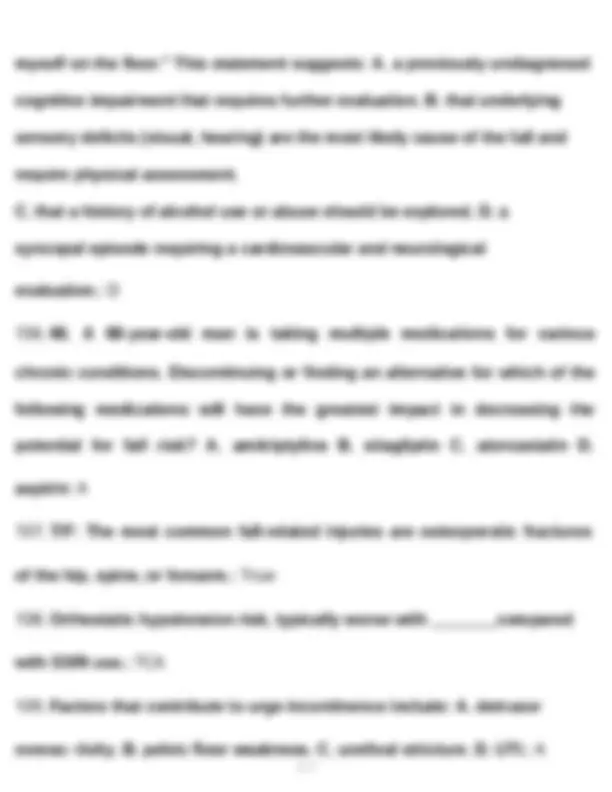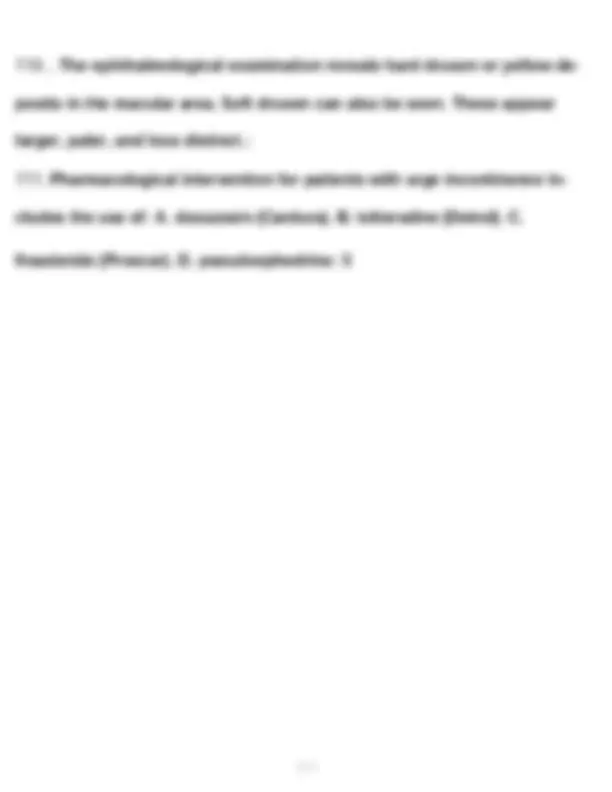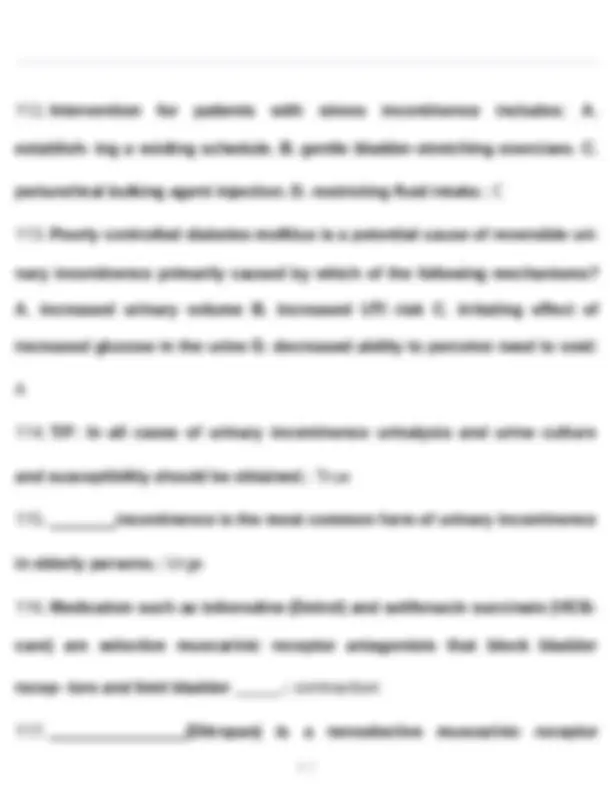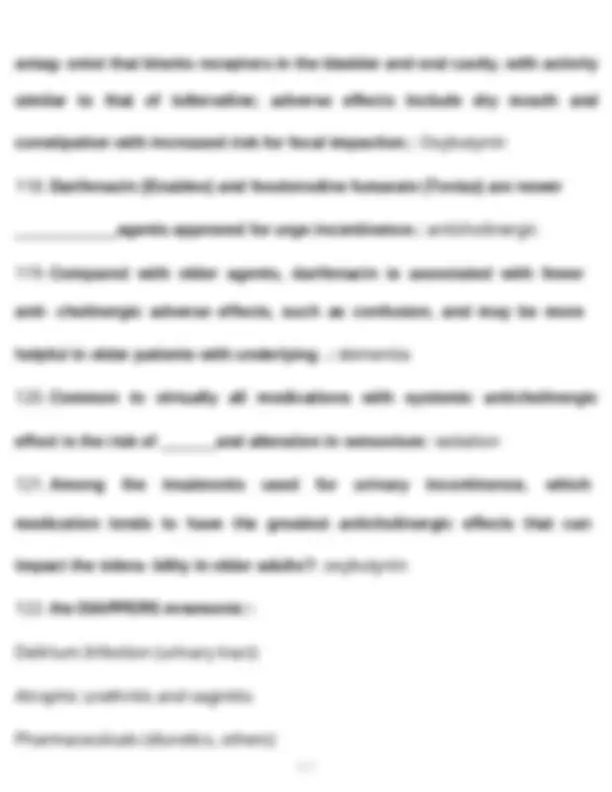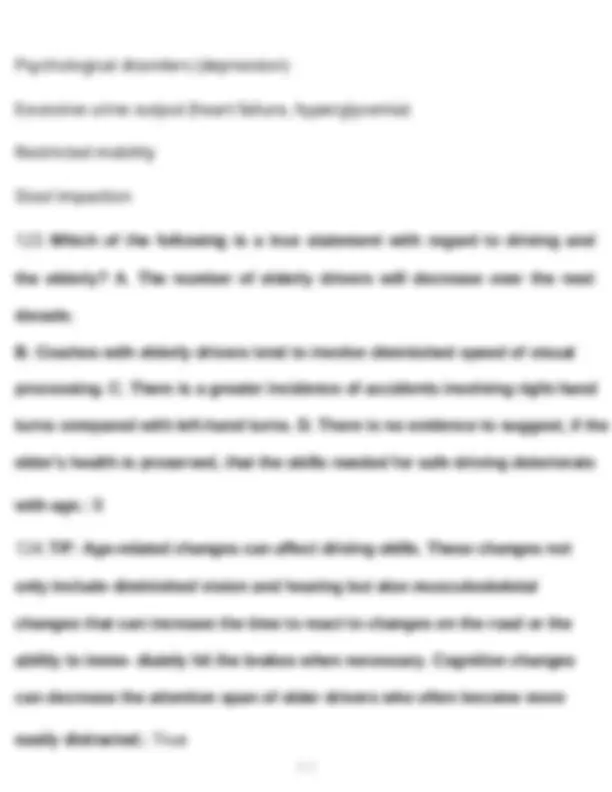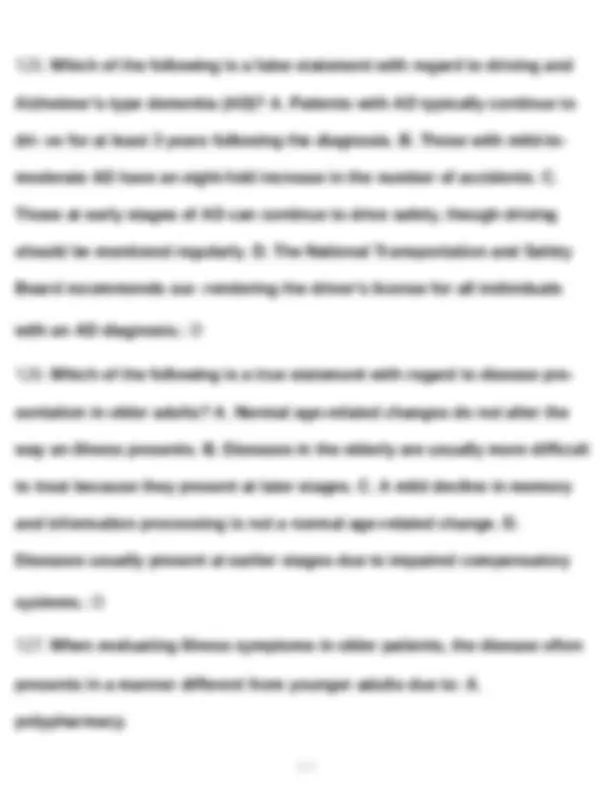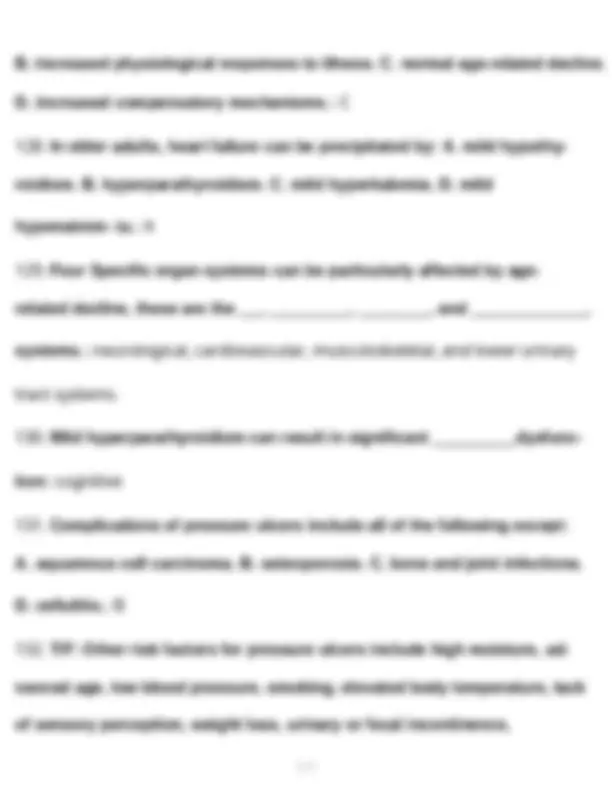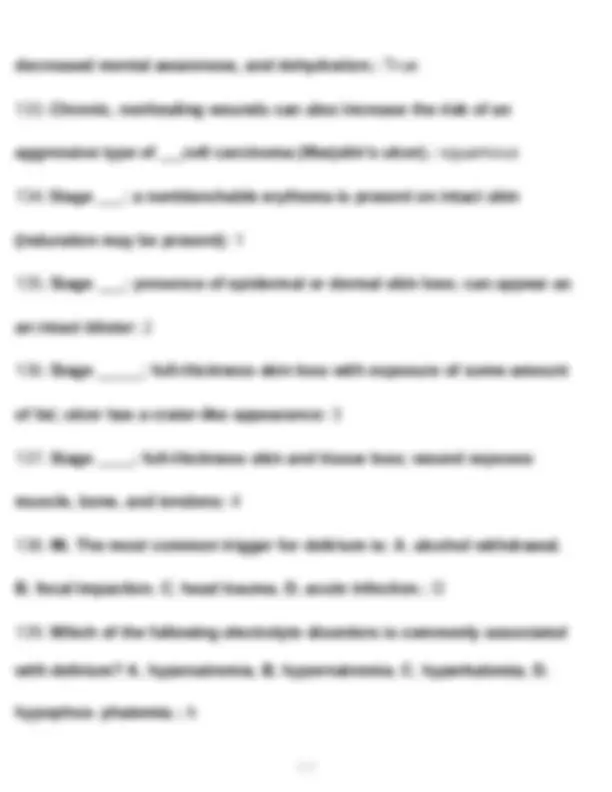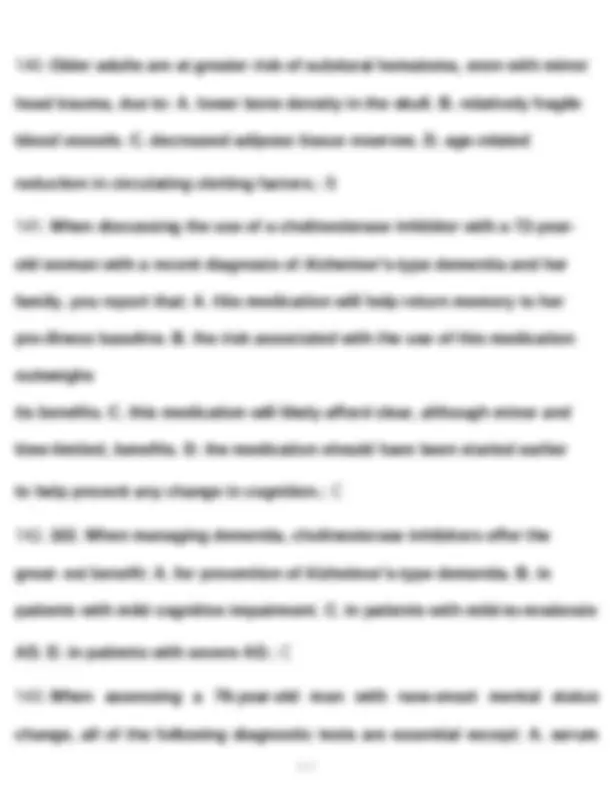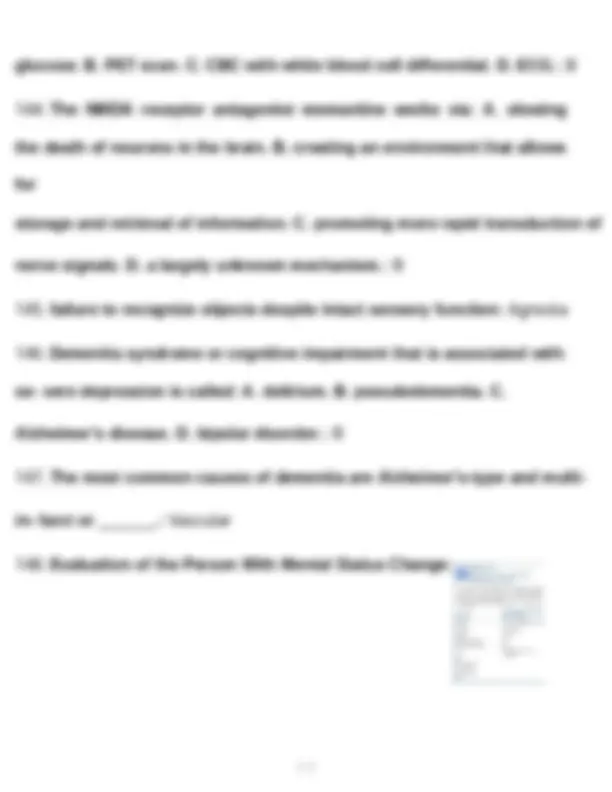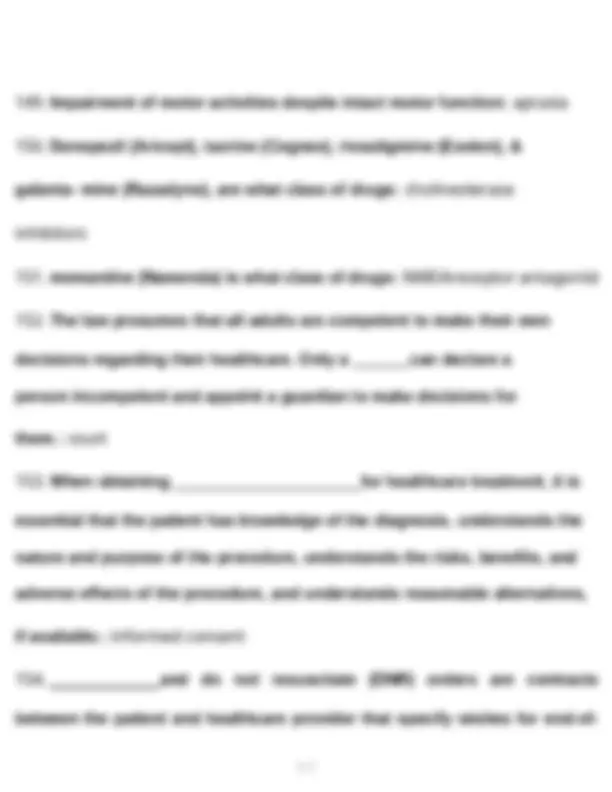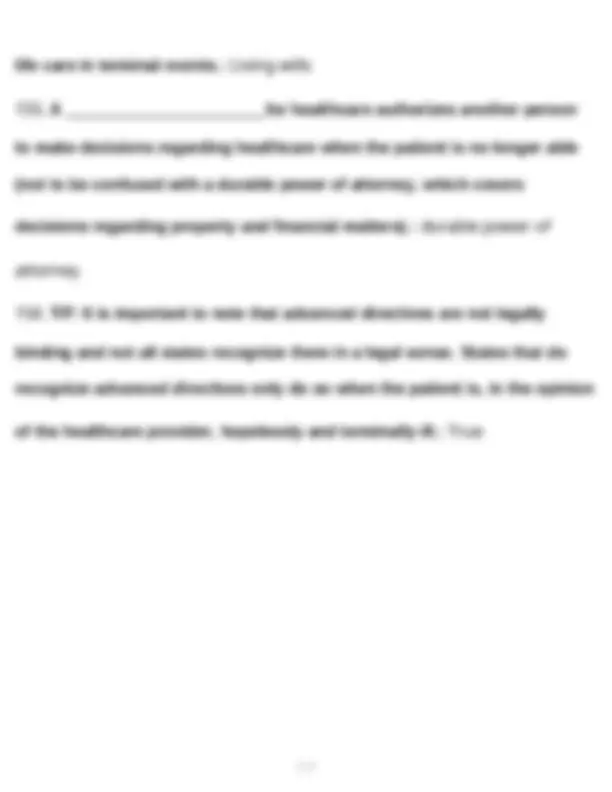Download FNP Board Review: Problems of Older Adult (Fitzgerald) and more Exams Nursing in PDF only on Docsity!
FNP Board Review: Problems of Older Adult
(Fitzgerald)
- is a sudden state of rapid changes in brain function reflected in confusion, changes in cognition, activity, and level of consciousness.: Delir- ium
- is a slowly developing impairment of intellectual or cognitive function that is progressive and interferes with normal functioning: Dementia
- T/F: Delirium is precipitated by an underlying acute cause, such as acute illness whereas a dementia has a variety of causes: True
- With dementia there are psychomotor changes (early or late) in the disease: Late
- What is important (related to medications) to look at when assessing a patient with delirium?: The last medication added or dose adjusted
- What are some problematic medications in the elderly related To delirium?: Systemic Anticholinergics -TCA
- FIRST-generation antihistamines (diphenhydramine)
- antipsychotics (Haldol)
- Opioids
- Benzodiazepines
- Alcohol
- Which electrolyte disturbance in particular could cause delirium?: Hypona- tremia
- Reasons for hyponatremia in the elder?: Elder kidney can not conserve sodium plus we give elders lots of hyponatremia causing medications like thiazides
- What are the most common infections in the elderly that can cause deliri- um?: UTI (#1) , CAP (#2)
- Delirium Mnemonic: Drugs Emotional
pressants [TCAs], firstgeneration antihistamines), neuroleptics (haloperidol, others), opioids (in particular, meperidine), longacting benzodiazepines (diazepam, clon- azepam), and alcohol. •Emotional (mood disorders, loss); Electrolyte disturbance, especially hyponatremia. •Low PO2 (hypoxemia from CAP, COPD, PE, MI); Lack of drugs (withdrawal from alcohol, other habituating substances). •Infection— Uri- nary tract infection and communityacquired pneumonia (the most common delirium trigger). •Retention of urine or feces; Reduced sensory input (blindness, deafness, darkness, change in surroundings). •Ictal or postictal state—Alcohol withdrawal is a common reason for an isolated first seizure in an older adult. •Under-nutrition—Pro- tein/calorie, vitamin B12, or folate deficiency, dehydration including postoperative volume disturbance.
- Metabolic (poorly controlled diabetes mellitus, undertreated or untreated hypothy- roidism or hyperthyroidism); Myocardial problems (myocardial infarction, heart fail- ure, dysrhythmia). •Subdural hematoma—Can be as a result of relatively minor head trauma to brain atrophy, fragile vessels.
- Metabolic reasons for delirium: Poorly controlled diabetes Undertreated hypo or hyper thyroid
- T/F: Either gender over age 80 most commonly present with dysthymia and confusion in ACS: True
- What cause Megaloblastic mania?: It is a reversible cause of Dementia due to pernicious anemia. Give vitamin K to reverse episode.
- Most common cause of dementia is -type dementia: Alzheimer's type
- 20% of dementia is -type dementia: Vascular
- 5% of dementia is -type dementia: Parkinson's
- Miscellaneous causes of dementia: HIV Dialysis encephalopathy Neurosyphilis Normal pressure hydrocephalus Lewy body disease Frontotemporal dementia
Cholinesterase inhibitor Donepezil (Aricept)
- Which drugs are most commonly prescribed if environmental manipula- tion fails to eliminate agitation or psychosis in the person with dementia: Sec- ond generation antipsychotics
- What are the risks for second generation antipsychotics in the elderly with dementia: Stroke and cardiovascular events
- Second generation antipsychotics worsen resistance and therefore make the blood clot more easily: Insulin
- T/F: The most common adverse effect of cholinesterase inhibitors include nausea and diarrhea.: True
- Why should you avoid Nitrofurantoin in the elderly?: Potential lack of efficacy in impaired renal function with Cr Cl < 60 mL/min (1 ml/s)
- Why should you avoid Amitriptyline in the elderly?: Significant risk of ortho- static hypotension
- Why should you avoid Zolpidem in the elderly?: Increase in fall and fracture risk
______
- Why should you avoid diclofenac (Voltaren) in the elderly?: Potential to promote fluid retention (NSAID class effect)
- Why should you avoid Sertraline (Zoloft) in the elderly?: Increased risk for hyponatremia (SSRI class effect)
- When you put an elder on an SSRI they should follow in a month to check .: Electrolytes
- T/F: Glipizide is preferred over glyburide as a sulfonyurea in the older adult: True, glyburide has a long half life in the older adult
- "All of a sudden I passed out and woke up on the floor" is syncope, dizziness or vertigo: Syncope
- Is intermittent claudication due to arterial or venous disease?: Arterial
- Hyper Pigmentation with bilateral ankle edema is found in insufficiency: Venous
- In the elderly population, the current fastest growing group is the age range: A. 71 to 75 years. B. 76 to 80 years. C. 81 to 84 years. D. 85 years and older.: D
tasks faced in older age: 1) ego differentiation versus work-role preoccupation (to develop satisfaction from one's self as a person rather than through the work role); 2) body transcendence versus body preoccupation (to find psycho- logical pleasures rather than becoming absorbed with the health problems or physical limitations imposed by aging); and 3) ego transcendence versus ego preoccupation (to feel pleasure through reflecting on one's life rather than dwelling on the limited number of years left to live).: Robert Peck
- Who has the theory of the Seasons of Life focuses on the relationship of physical changes to personality, and ultimately, individuals must come to terms with the inevitability of death.: Daniel Levinson
- Which theory views aging as a process of mutual withdrawal in which older adults voluntarily slow down their activities, such as by retiring from occu-
pational and social endeavors. Proponents of this theory suggest that social withdrawal benefits the individual and society.: The disengagement theory
- Which theory sees a positive correlation between keeping active and aging well. Proponents of the activity theory argue that mutual social withdrawal runs counter to traditional American ideals of activity and industry: the activity theory
- Which theory postulates that basic personality, attitude, and behaviors remain constant throughout the life span.: the continuity theory
- Difficulty with appreciating the content of conversation in noisy environ- ment: Presbycusis
- Decline in sense of smell: Hyposmia
- Painless vision change that includes central vision distortion: Age related maculopathy
- Results in near vision blurriness: Presbyopia
- Can result in peripheral vision loss: Chronic Glaucoma
A. hypertension. B. hyperlipidemia. C. tobacco use. D. alcohol abuse.: C
- A common complaint for a person with presbycusis is: A. general diminu- tion of hearing. B. diminution of high-frequency hearing. C. worsening hearing at night. D. unable to hear low-pitched sounds.: B
- What is a progressive, symmetric, high-frequency, age-related sensory hearing loss that is likely caused by cochlear deterioration.: Presbycusis
- Distance vision poses the greatest problem for individuals with . As the lens becomes more opaque, near vision also deteriorates. There is a loss of ability to distinguish contrasts and progressive dimming of vision. Close vision is usually retained, and there are occasional improvements in reading ability.: senile cataracts
- Presbyopia refers to age-related vision changes caused by a progressive of the lens.: hardening
- With presbyopia Patients most often complain of (near or close) vision problems, usually first manifested by difficulty with
reading : close smaller print
- normal age-related vision changes include a progressive of the lens and decreased flexibility of the sclera, in part leading to the perception of washing out of colors, difficulty seeing under low illumination, and increased sensitivity to glare.: Yellowing
- Painless, gradual onset of increased intraocular pressure leading to optic atrophy and loss of peripheral vision: Open Angle glaucoma
- e80% of all glaucoma. Risk factors: elevated intraocular pressure, African American race, age e 40 years. Periodic screening with tonometry, assessment of visual fields. Treatment with topical miotics, beta blockers, other drugs, or surgery effective in vision preservation.: Open Angle glaucoma
- Sudden increase in intraocular pressure
Besides aging, risk factors include tobacco use, sun exposure, family histo- ry.: Age-related maculopathy
- the most common cause of newly-acquired blindness and vision loss in elderly loss of the central vision field. This disease is seen more often in women of European descent. A history of cigarette smoking and a family history of the disease are often found as well; & excessive sun exposure: Macular Degeneration
- Age-related changes in an elderly adult include all of the following except: A. total body water decreases by 10% to 15% between ages 20 and 80 years. B. body weight as fat increases from 18% to 36% in men and from 33% to 45% in women. C. increase in serum albumin. D. increase in gastric pH.: C
- A general principle of drug absorption in an elderly adult is best described as: A. amount of absorption is decreased. B. rate of absorption is changed. C. drug absorption is altered but predictable. D. bioavailability is altered.: B
- When evaluating serum creatinine in an elderly adult, the clinician con- siders that: A. this value is influenced by glomerular filtration rate. B. age- re- lated physiological changes do not influence this laboratory value. C. male and female norms are equivalent. D. an increase is an expected age- related change.: A
- Anticipated age-related changes that can result in less drug effect include: A. loss of beta-2 receptor sites. B. lower gastrointestinal (GI) pH. C. increased renin-angiotensin production. D. increased GI motility.: A
- Age-related changes in the gastrointestinal system include all of the fol- lowing except: A. decreased gastric acid production. B. decreased gastric motility. C. increased GI surface area. D. decreased gastric emptying.: C
- To avoid rebound gastric hyperacidity following discontinuation of long-term PPI use, all of the following methods can be used except: A. gradual- ly tapering the PPI dose. B. switch to every-other-day dosing of PPI. C. switch to a low-dose H2 RA therapy. D. avoiding antacid therapy when symptoms flare.: D
- An expected age-related change in the older adult with intact renal function is decreased muscle mass and an associated: A. increase in serum creatinine. B. decrease in serum creatinine. C. minimal impact on serum creatinine. D. increase in creatinine clearance.: B
- In an older adult with advanced impaired renal function, the clinician anticipates that there is usually no need to adjust the antimicrobial dose with the use of: A. ceftriaxone. B. tobramycin. C. levofloxacin. D. vancomycin.: A
- Which of the following medications has little anticholinergic effect? A. diphenhydramine B. amitriptyline C. chlorpheniramine D. loratadine: D
- Is Hypertension associated with the use of anticholinergic agents in older adults.: No
- The process of absorption, distribution, metabolism, and elimination of a drug is known as: A. pharmacodynamics. B. drug interactions study. C. pharmacokinetics. D. therapeutic transformation.: C
- The study of biochemical and physiological effects of drugs on the body
or disease is called: A. pharmacodynamics. B. pharmacokinetics. C. biotrans- formation. D. bioavailability.: A
- When considering the properties of a drug in the body, which of the follow- ing does not change as a person ages? A. excretion B. biotransformation C. pharmacodynamics D. absorption: C
- Compared with a healthy 40-year-old adult, CYP 450 isoenzyme levels can decrease by % in elderly adults after age 70. A. 10 B. 20 C. 30 D. 40: C
- When considering pharmacological options to treat neuropathic pain in a 72-year-old man, which of the following is the least appropriate option due to its anticholinergic effect? A. nortriptyline B. amitriptyline C. duloxetine D. venlafaxine: B
- T/F:Age-related changes can significantly influence the rate of absorption and half life is often increased Age-related decreases in GI blood flow, gastric motility, and gastric emptying mean that medication stays in the gut longer, whereas decreased GI surface area can lead to erratic absorption. The use of antacids in: True
- How to avoid rebound gastric hyper secretion with PPI discontinuation:


